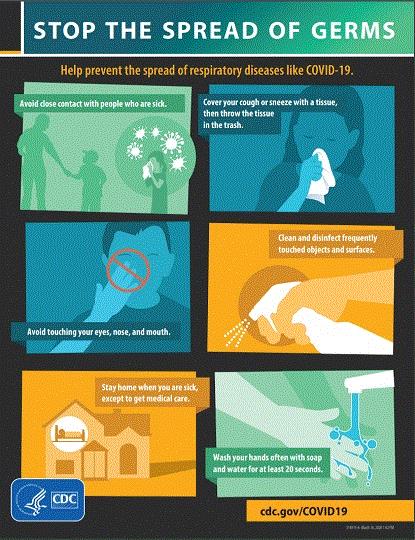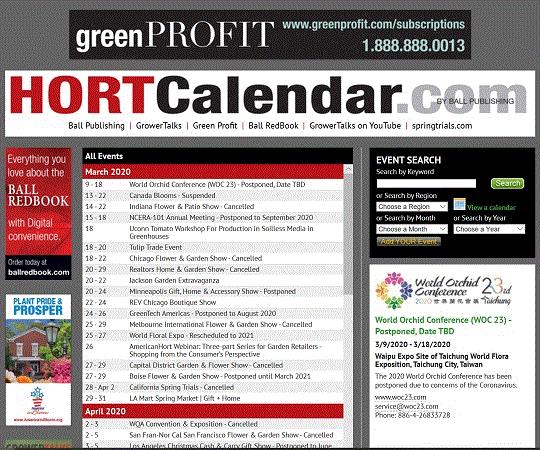Strategies for Dealing with COVID-19
Since I sent my last newsletter not even two weeks ago we've seen a tectonic shift in the world around us, from how we interact socially (virtually nonexistent now) to how we conduct business, due to COVID-19. It’s an uncertain time, but one thing is for sure: people are relying on stocked grocery stores to help them through this crisis.
In some ways, the panic buying could have been expected—it’s the first thing that happens when a snowstorm hits, for example. Everyone runs out for milk and bread. This is way more severe than a snowstorm, so the panic buying is much more intense. Demand continues for fresh produce at the grocery store, but there’s reduced demand from restaurants, institutions and universities.
To that end, United Fresh President & CEO Tom Stenzel sent out an update Tuesday with links to two separate resources, one for producers and another for consumers. The industry-facing site includes links to the CDC, WHO, USDA statements and more. The consumer-facing site reassures the food supply is safe (and that there are no clinically confirmed cases of COVID-19 linked to the consumption of fresh produce) and encourages people to not hoard food.
The organization also created a LinkedIn Group for industry members to share, connect and talk about specific needs. That group can also help connect distributors with excess produce to retailers looking to restock shelves.
Tom also noted in the message that the Small Business Administration (SBA) has loans up to $2 million available for small businesses, agricultural cooperatives and non-profits that are in declared disaster areas via its SBA Disaster Loan Program.

Finally, if you’re looking for basic information on how to keep you and your employees safe during this stressful time, the Florida Nursery, Greenhouse & Landscape Association (FNGLA) provided a list of links for growers and retailers. Here’s one for printable CDC recommendations on facts and safety information related to COVID-19 in English and Spanish.
New developments are coming out daily with regard to small business assistance, so I'll try to stay on top of what’s happening to get it out to you when I can. If you see something you think would be beneficial to blast out to the industry, email it to me at jpolanz@ballpublishing.com.

Seasonal Workers

Labor, which is already a major challenge, will likely continue to be in multiple ways. On Monday, it was announced the U.S. Consulate in Mexico would cease processing visas, meaning some seasonal workers won’t be able to come in to the country to work. AmericanHort sent out a message from Ken Fisher on Tuesday that they're working with “government partners and business coalitions to ensure these programs are not unnecessarily disrupted. We are pressing the case that H-2 visa processing should be prioritized and should continue.”
The Washington Post reported Wednesday that the American Farm Bureau Federation is also working with the federal government to find “safe, practical ways” to bring seasonal workers into the U.S. The story stated: “Many seasonal workers will still be granted entry. The State Department is allowing laborers with previous work experience in the United States and who do not require in-person interviews to return, according to the federation. In 2019, 258,000 migrant workers received H-2A visas, the vast majority of whom were from Mexico.”
In an update letter to members Thursday, United Fresh President & CEO Tom Stenzel relayed a new partnership between USDA and the Department of Labor to identify foreign and domestic workers that may be able to transfer to other U.S. agriculture sectors to fulfill workforce needs. Read USDA’s release on that HERE.

Cancellations & Delays
Of course, there have been many cancellations in the recent days and it seems like we can expect more as we go. The biggest one for me was the NCERA 101 International Meeting that was scheduled to take place this week. Fortunately, that's already been rescheduled for September 13-17, still to take place at the Marriott University Park Hotel in Tucson, Arizona, on the main campus of the University of Arizona. You can find the revised details HERE.
GreenTech Americas, originally scheduled for next week, is being rescheduled for August 25-27, also still in the same location as before at the Queretaro Centro de Congresos, QRO Mexico. CLICK HERE for those details.

It’s a fluid situation when it comes to when we’ll be able to gather in large groups again, so keep checking our HortCalendar.com website to see whether or not your industry event has been cancelled and/or rescheduled.
2020 Greenhouse Training (Online, of Course)

Education can continue via web-based learning, though, and this year the University of Florida’s online Greenhouse Training course includes a new hydroponics production class. These are four-week, award-winning online courses in both English and Spanish, offered by University of Florida IFAS Extension. The first course begins on June 1 and includes streaming videos, readings and assignments.
New modules are activated each week during the course and they're available any time of the day. University instructors are available for help and interactive discussions. The university offers discounts for registering multiple staff.
This year’s course lineup includes:
-
Greenhouse 101: June 1 - June 26 (registration closes June 8)
-
Nutrient Management 1 (introduction): July 6 – July 31 (registration closes July 13)
-
Advanced Nutrient Management: August 31 – September 25 (registration closes September 7)
-
Disease Management: September 28 - October 23 (registration closes October 5)
-
Weed Management: October 26 – November 20 (registration closes November 2)
-
Hydroponic Vegetable Production: November 9 – December 11 (registration closes November 16)
To register, visit http://hort.ifas.ufl.edu/training/.

Help Influence Trucking Regulations
It’s hard to say how current shutdowns will impact the trucking industry, but right now there are other regulations at play that we can have an impact on. AmericanHort is asking for more support from industry members to help change the definition of “agricultural commodity” to specifically include horticulture and floriculture. Currently, Senators David Perdue (R-GA) and Jeff Merkley (D-OR) are circulating a letter to the Senate’s Transportation Appropriations subcommittee to include the same language from the House bill Agriculture Trucking Relief Act into the legislation to fund the government for FY2021.

"Crops that have long been recognized as agricultural commodities—such as nursery and greenhouse production—remain in limbo despite facing the same challenges as other agricultural commodities: seasonality, perishability and narrow market windows,” writes AmericanHort’s advocacy team. “We’re hoping for an equally strong showing in the Senate to showcase how big of an issue this is for producers and shippers alike. We can’t wait through another harvest season full of uncertainty.
CLICK HERE to fill out a quick and easy form letter and lend your support.

TP & Weed
On the lightest note I can possibly muster right now, I end with this: people are not just hoarding toilet paper, but also marijuana, apparently. According to 420Intel, Americans are more than a little concerned that their favorite dispensary may have to close due to the spread of COVID-19. Shops all over the country have reported an uptick in the amount of customers and how much they’re buying at once.
“Apparently people need weed and toilet paper, that I am sure of,” the story quotes Wanda James, 56, who owns the Simply Pure dispensary in Denver. “They are absolutely stocking up."

You can read the full story HERE.
As always, feel free to email me at jpolanz@ballpublishing.com with comments, questions, news and views.
Until next time, stay safe and be healthy,

Jennifer Polanz
Editor-at-Large
Inside Grower
This email received by 24,304 loyal readers!
Interested in advertising in Inside Grower? Contact Paul Black or Kim Brown and they'll show you how easy, effective and affordable it is.